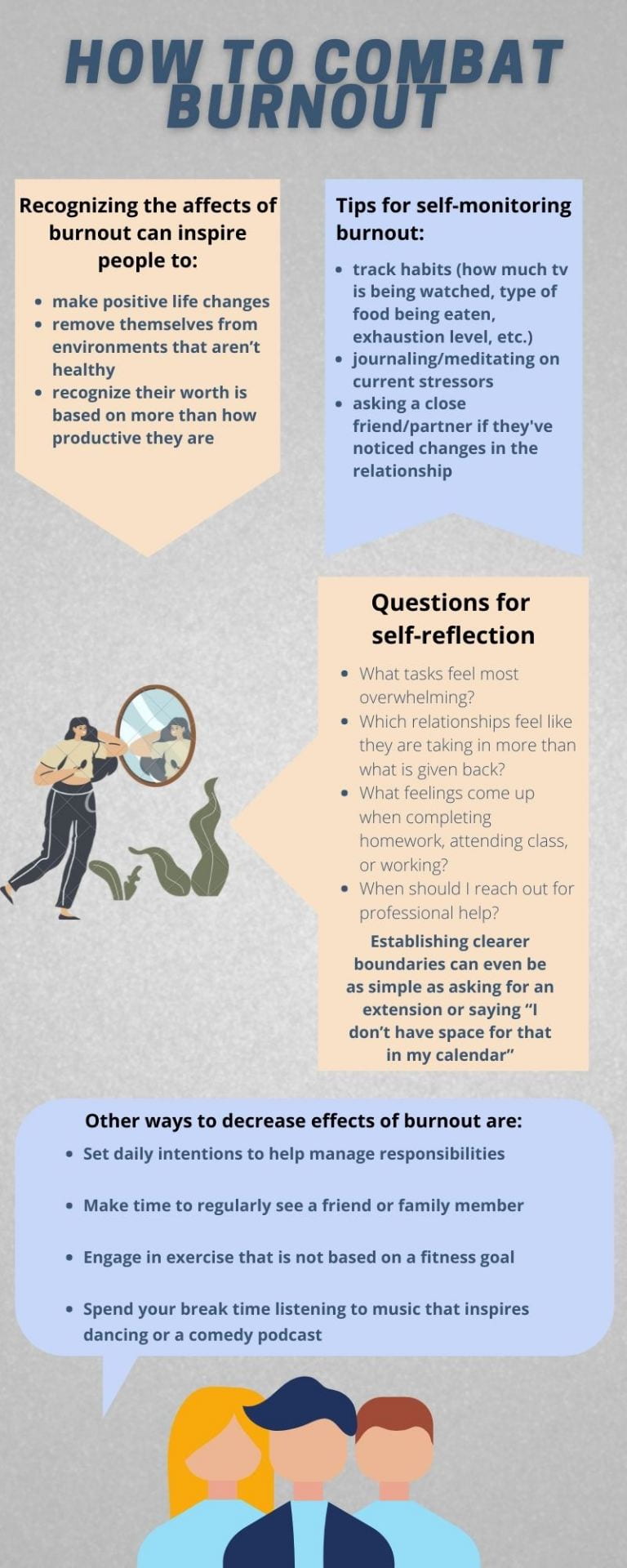In the 1970’s Herbert Freudenburger coined the term “burnout” and defined it as “the extinction of motivation or incentive, especially where one’s devotion to a cause or relationship fails to produce the desired results”. He created the term after recognizing similar experiences from people with careers in “helping” professions. Since then, our understanding of who experiences burnout has evolved. People can feel burnout from many things, such as their job, school, interpersonal relationships environments (such as remote work/class). As we near the end of another quarter at DePaul, students, professors, and staff/faculty may be experiencing the collective burnout that often comes with finals week and still being in a pandemic. The Office of Health Promotion and Wellness wants to encourage all members of the DePaul community to recognize the signs of burnout in themselves and take time to reinforce or introduce boundaries that can decrease the effects of burnout.
Burnout can be closely related to the amount of stress one is facing. Stress can be a positive tool to stay motivated and a sign of growth. However, it depends on the amount of stress and how the person can handle different stress loads. In an article written for helpguide.org they explain that the brain does not recognize differences between physical and emotional stress. They discuss various kinds of stress including:
- Workplace Stress
- Job Loss/Unemployment Stress
- Financial Stress
- Caregiver Stress
- Greif and Loss
While that list does not provide all forms of stress (such as academic) it does highlight the idea that all individuals are experiencing some form of stress at almost any point in their lives. The article also explains that the stress changes from a constructive factor (helping to stay focused or alert, increase energy levels) to a deconstructive factor (frequently feeling overwhelmed or easily anxious) when there is an excessive amount. There is no official answer to how much stress is “too much” but recognizing the signs of burnout can help with figuring out where the excessive stress is coming from.
- Chronic exhaustion
- Having cynical thoughts about school/work/peers
- Feeling like tasks that were once manageable are now impossible
- Isolating from peers, co-workers, and family members
- Not participating in community events
- Experiencing heightened depression or anxiety symptoms
- Taking on more responsibility than is realistic.
Signs of burnout can look different for everyone which is why self-reflection and time for yourself during high stress times is important. And while these side effects may seem obvious, it is possible that the person experiencing burnout is unaware that they are showing these signs. Overloading daily schedules, working more than is expected, and agreeing to take on more tasks when already feeling overwhelmed is often revered. However, these actions are not sustainable and contribute to the large-scale burnout that so many people seem to be experiencing.
When transitioning from one responsibility to the next (such as from work to class) spend even five minutes doing something that is fun and relaxing and not on your “to-do list.” We fuel our burnout by overextending ourselves rather than providing more space for self-care.
But this does not have to be an individual process. By reaching out to peers, friends, teachers, co-workers, supervisors, or professionals we can get support and help. DePaul has multiple resources that support students in creating routines to remind us that we have value outside of academic and workplace responsibilities including: Health Promotion and Wellness, University Counseling Services, and the Collegiate Recovery Community.
Resources:
https://www.verywellmind.com/stress-and-burnout-symptoms-and-causes-3144516
https://www.ncbi.nlm.nih.gov/books/NBK279286/
https://www.helpguide.org/articles/stress/stress-symptoms-signs-and-causes.htm
https://offices.depaul.edu/student-affairs/about/departments/Pages/ucs.aspx

Greetings!
Nice blog and thank you for sharing it.
https://www.touchoflifeaustin.com/